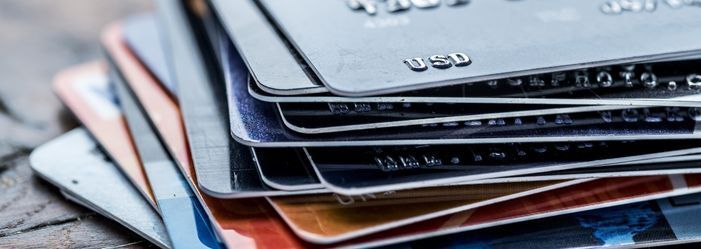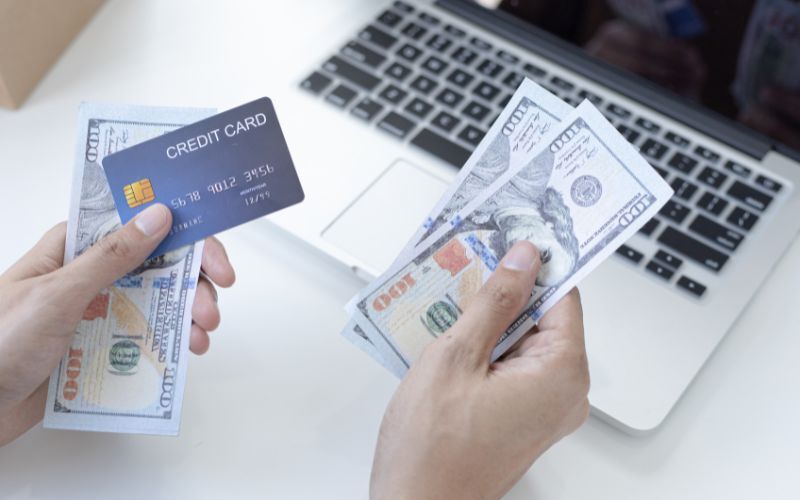Last Updated: March 21, 2024
Learn how to use a credit card the right way

Disclaimer: We are not qualified legal or tax professionals and are not giving advice. Always speak with a qualified professional before making any legal or financial decisions.
Credit cards offer more than just a convenient way to make purchases; they're a powerful tool for building credit and earning rewards. However, the key to harnessing their potential lies in responsible management.
By mastering the art of responsible credit card use, you not only avoid common pitfalls like debt and high interest rates but also leverage your spending to improve your financial standing.
In this post, we'll explore essential strategies to ensure your credit card works for you, not against you, helping you maintain financial health and security.
Skip the article and connect with a debt specialist now. Click here for a free consultation.
The Perks and Pitfalls of Credit Cards
Credit cards offer convenience and perks like rewards points and cash back, but they also carry risks if not used carefully. Responsible credit card use requires understanding both the benefits and potential downsides.
Benefits of using a credit card:
- Earn rewards like cash back, points, miles
- Fraud protections
- Can help build a credit history
- More secure than carrying cash
- Deferred payment helps with cash flow
Risks of irresponsible credit card use:
- Paying only minimum balances means more interest paid over time
- Late fees, over-limit fees, and other penalties
- Getting into debt that is difficult to pay off
- Hurting your credit score if you miss payments
- Higher likelihood of overspending
How to Choose the Right Credit Card
With hundreds of credit cards on the market, picking the right one for your needs is key.
Consider things like:
- Rewards - cash back, travel miles, etc. Pick a card with rewards you'll use.
- Interest rates and fees - cards with lower rates help save on interest.
- Credit Card limit - should align with your spending needs.
- Perks- like purchase protection, roadside assistance, etc.
- Your credit score - this impacts eligibility for top cards.
Shopping around and comparing cards is wise. Pre-qualification tools let you see your chances of approval before applying.
How to use a credit card
Credit cards are a great tool. They are also the number one cause of debt for Americans. As a country, we owe more than $887 billion on our credit cards. Each credit card holder has an average balance of $5,769.
Credit cards are set up to make the credit card companies money through interest rates, fees, and penalties. Let's talk about how to use a credit card responsibly.
How Does a Credit Card Work?
Simply put, a credit card is a revolving, unsecured loan. You have a credit limit - that is the most you can charge on your card or the total amount of the loan. The balance is what you have borrowed.
As you pay that credit card balance off, the available credit limit increases and as you use it, the available credit limit decreases. This is what makes it revolving, unlike an installment debt where you can use the amount once.
Check out this blog post if you have any questions about terms connected to a credit card.
Credit Card Interest, Fees, and Penalties
Credit card companies make their money on interest charges, fees, and penalties. The article we linked above sheds more light on this. Please remember always to read your card agreement carefully!
APR or Annual Percentage Rate
This is how much you are charged each month on the unpaid balance. If you carry a balance on your card, you will pay interest on your interest charges. APR can be adjusted annually, as a penalty for late payments, for cash advantages, and other actions.
Your APR is set, in part, on your credit scores. The better your credit score, the lower your interest.
Fees
Fees are charged for various actions from having the card (annual fee) to late fees to cash advance fees. Ask what is so special about the card that it needs annual fees. Not all credit cards have all the fees, but all have some fees.
Sometimes, you can end up with both a fee and an APR charge. Balance transfers always have both fees and special APRs.
Now let's look at how to use a credit card.
Understand the terms and conditions of your credit card before you apply
The terms are on either the information sheet, website, or the back of your credit card statement. A credit card issuer often puts them in very fine print to make it harder for you to understand them.
Always look for the following and review them carefully:
- Interest charges or APR (these can change each year or if you have a card with an introductory period)
- Penalty APRs
- Fees
- Penalties
- Grace periods
Remember that your interest rate is based on your credit score.
Make a budget and stick to it, using your credit card only for emergencies
Budgets are not much fun, but they are important. There are dozens of different types of budgets from the very strict to the more general. Use the one that fits your personality but make a budget and stick to it. For more information on budgets, click here.
Use your cards only for true emergencies or for purchases you can pay off right away. If you are charging everyday purchases on your cards, it is time to talk to a credit counselor and rethink your living style and expenses.
Pay off your balance in full every month to avoid interest charges
Carrying a balance on your credit card costs a lot of money.
Let's take a look at how paying off a credit card works. Let's say you have a $1,000 balance and an average interest rate of 16.27%.
If you pay off the card before the interest rate applies (the grace period), you pay $1,000.
If you make the minimum payment (usually a percentage of your remaining balance or $35, whichever is greater), it will take 37 months to pay off that $1,000 and cost you $273 in interest charges plus any fees for a minimum total of $1,273. If you're on a tight budget, explore these strategies on how to pay off credit card debt effectively without straining your finances.
The minimum payment trap is the main reason people get into debt.
Keep an eye on your credit score and work to improve it over time
Improving a credit score will improve your APR. Credit scores based on your credit history are not a magical measurement of how well you are doing financially. Your credit history is the measure of whether or not you make on-time payments and how much of your revolving debt you are carrying as a balance (credit utilization ratio).
In fact, the number one factor in determining your credit score is your payment history. This and your credit utilization ratio are very important numbers to keep your eye on.
By making on-time payments and paying down your loans, you can improve your credit health. As a plus, the better your credit report, the easier it is to borrow money.
For more information on credit history or credit scores, click here.
Be aware of scams and protect yourself from identity theft
Scams and scammers are everywhere. Stay alert and avoid some of these common scams.
Emails
If you get an email from a retailer notifying you that there is a problem with your credit card or bank account, it is more than likely from a scammer. DO NOT click on any links within that email. If you do, kiss your money and your privacy goodbye.
Hover over the name associated in the body of the email and the actual address will appear. For example, “Costco” sent a reward email, but the email address is reply@gru.notcostco.com. Looks like a real Costco ad, but it is a phishing scam.
If you think it may be a real email, open up an internet browser and go to the website yourself by typing or selecting the real URL, then log into your account from there to see if you have any messages or notifications.
Urgent Emails
Urgent emails are usually scams. If it is urgent or immediate or limited time, someone wants your information for fraudulent reasons. Asking for charity or donations can be another scam. Always go directly to the verified website to donate.
The police, sheriff, the court, and IRS WILL NOT contact you via email. Law enforcement will show up on your doorstep, and the courts and IRS sends paper letters. Do not pay anyone who emails you.
A legitimate company will not ask you to pay in gift cards.
It's a deal (or a Steal)
The old saying “if it’s good to be true it probably is” works for online purchasing as well. If you know an item’s worth and you suddenly find it for far less, you’ve either got a scam or a knockoff.
Gift cards can be another scam. Buying them online from sellers on eBay-type websites can almost guarantee you an empty or expired gift card.
Fake Websites
Setting up a fake website that looks just like the real thing is pretty easy. Look for the following red flags:
- unusually low prices
- no reviews or 100% positive reviews
- poor grammar or spelling
- no SSL (the padlock in the address bar or https: )
- no contact addresses or physical addresses
- no or bad terms and conditions
Request for Private Information
Do not ever give out your personal information like any login information and passcodes, social security numbers, addresses, your voter affiliation, etc. without thinking about WHY someone needs that information. Likewise, don’t enter your credit card or debit card unless you have verified the webpage!
This includes fraud alert calls from your credit card. Hang up and call them back at the number on the back of your card.
Shop around for the best credit card deals available
No matter why you want a credit card, there is one for you. It is a matter of looking for the right card. For instance, if you are getting a credit card for the first time or are rebuilding your credit, look for a secured credit card - this bases your credit limit on the amount of money you put in a savings account to "secure" your card. As long as you pay your bills each month, you will eventually get the security back along with an improved credit report.
The different Types of credit cards
Here is a list of the credit cards available:
Low-Interest Credit Cards
- Annual interest rates (APR) are lower than other cards or 0% APR promotion
- Generally offered by credit unions
- Not much in perks like cash back or air miles
- 0% APR promotions look great, but check the interest charges after the promotion. The card may turn out to be very expensive
Balance Transfer Credit Cards
Always know what the APR will be after any promotional period ends.
- Allows you to move debt from one card to another with 0% APR on the balance for 6 to 21 months
- May have an upfront fee based on how much you are transferring
- Generally no rewards
- APR after the introductory period can be very high
Rewards Cards
Earning rewards can be great if you will use credit card rewards. The simplest is a straight cash back that you can apply to your credit card balance. Below are some examples of reward credit cards available.
Cash-back credit cards
- Earn rewards as a certain percentage on credit card purchases
- Can be all purchases or selected categories based on purchase type or monthly promotions (gas stations one month, hotels another, etc)
Travel credit cards
- Earn air miles, hotel stays, and other travel perks.
- Generally branded
Build Credit or Rebuild Credit
- Secured credit cards
- Requires a security deposit
Student credit cards
- Must be a student
- No security deposit
- Many have perks
Unsecured credit cards for bad or limited credit
- Fees or APR can be outrageously high
Store Credit Cards
- Issued by a specific chain such as Target or Wal-mart
- Maybe a rewards card or earn purchasing credit at the store
- Generally have higher charged interest and lower credit limits
- Closed loop cards allow you to use the card ONLY at that specific chain
- Open loop cards allow you to use the card anywhere
Small Business Credit Cards
- Designed for business owners
How to Choose The Right Credit Card
This decision tree can help you find the best credit card.
- Do you have good or excellent credit?
- No – look for a no-annual fee card, starter card, student card, or secured card
- Yes – go to question 2
- Will you pay in full each month?
- No – look for a 0% APR or 0% balance transfer card. (And then pay it off as quickly as possible)
- Yes – go to question 3
- Do you fly or stay in hotels a lot?
- No – look for a cash-back credit card
- Yes – look for a travel card if you plan to earn more than 30,000 flight miles or 20 hotel nights each year. Otherwise, your points are devalued at the end of each year
- Do you plan to keep your card for more than 1 year?
- No – focus on initial rewards and bonuses
- Yes – look for the best ongoing rewards and lowest fees
The best way to use a credit card

If you are planning on making major purchases and can pay them off within the grace period, many credit cards offer purchase protection. You'll need to use one to book travel and hotel rooms (don't use a debit card for this - they put a hold on a greater amount than your room costs).
Accidental fraudulent purchases may have protections.
Do not use your cards for everyday purchases.
FAQs
Conclusion
Used responsibly, credit cards can be extremely beneficial financial tools that provide convenience, and rewards, and help build your credit profile. Credit cards are great as long as you understand the terms, can pay off the credit card bill within the billing cycle, and stick to a budget.
However, credit cards also come with the risk of spiraling into unmanageable high-interest debt if used irresponsibly. It is critical to educate yourself on how credit cards work, carefully evaluate card terms and conditions, create a budget, make payments on time, and avoid frivolous spending. Credit cards can get you into debt faster than almost any other financial action.
Used wisely, credit cards can be instrumental in building financial health. But if misused, they can rapidly create a cycle of debt. Approach credit cards with caution, stick to your budget and make payments on time every time.
If you are struggling with overwhelming debt and want to explore your debt relief options, Pacific Debt Relief offers a
free consultation to assess your financial situation. Our debt specialists can provide objective guidance relevant information and support to help find the right debt relief solution.
*Disclaimer: Pacific Debt Relief explicitly states that it is not a credit repair organization, and its program does not aim to improve individuals' credit scores. The information provided here is intended solely for educational purposes, aiding consumers in making informed decisions regarding credit and debt matters. The content herein does not constitute legal or financial advice. Pacific Debt Relief strongly advises individuals to seek the counsel of qualified professionals before undertaking any legal or financial actions.
Reduce Your Credit Card Debt By Up to Half

BBB Reviews | 4.9/5.0 Rating









 Do Not Sell My Personal Information
Do Not Sell My Personal Information